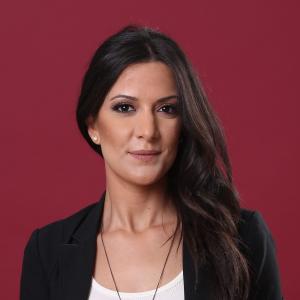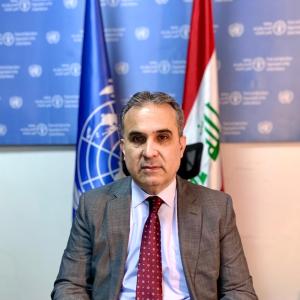FAO Showcases Climate-Smart Solutions and Local Success Stories at Baghdad’s16th Agricultural Week Exhibition
22 April 2025
Baghdad, 21 April 2025 – Under the patronage of H.E the Prime Minister of the Republic of Iraq Mr. Mohammad Shiaa Al Sudani, represented by His Excellency the Minister of Agriculture, Dr. Abbas Jabr Al-Maliki, and in close partnership with the Ministry of Agriculture, the Food and Agriculture Organization of the United Nations (FAO) concluded its participation in the 16th Agricultural Week held at the Baghdad International Fair from 15 to 20 April 2025.

Held under the theme “Supporting Agriculture for a Sustainable Future”, this year’s edition of the fair focused on agricultural mechanization, production, food industries, and packaging technologies, bringing attention to the critical role of innovation and modern tools in strengthening Iraq’s agri-food systems.
FAO’s contribution to the fair reflected this theme by highlighting the Organization’s work in advancing climate-smart agriculture, innovation, and rural resilience. At its booth, FAO showcased tangible results from the use of modern and sustainable agricultural technologies, equipment, and techniques applied in farmer training. The booth also featured high-quality local products developed by partners through value chain development programmes, providing them with increased visibility and marketing opportunities.
These achievements were made possible through FAO-led interventions implemented in close collaboration with governmental partners, and with the generous support of partners including the European Union, Global Affairs Canada (GAC), the Swedish International Development Cooperation Agency (SIDA), the Governments of Norway and the Netherlands, and the Global Environment Facility (GEF).
“FAO’s presence at the 16th Agricultural Week reflects our deep commitment to supporting Iraq’s agricultural transformation. Through our strong collaboration with the Ministry of Agriculture and with the valuable support of our donors, we are helping to build resilient livelihoods, strengthen value chains, and promote innovation that serves both people and planet. I also take this opportunity to congratulate His Excellency the Minister of Agriculture and the organizers for the success of this 16th edition.” said Salah El Hajj Hassan, FAO Representative in Iraq.
The fair also featured a visit to the FAO booth by H.E. Dr. Abbas Jabr Al-Maliki, Minister of Agriculture, who interacted with the producers and partners. The Minister praised the quality of the showcased products and acknowledged FAO’s contributions in advancing the agriculture sector in Iraq.
“The partnership between the Ministry of Agriculture and FAO is a model of effective cooperation. We highly value FAO’s efforts in empowering farmers, supporting rural communities, and introducing modern agricultural solutions that meet the needs of today and tomorrow, and we are proud of this strategic partnership.” said H.E. Dr. Abbas Jabr Al-Maliki.
During his visit, H.E. Dr. Abbas Jabr Al-Maliki also honored FAO with the Shield of Creativity and Excellence in recognition of the Organization’s outstanding participation in the fair.
Throughout the week, the FAO booth attracted around 3000 visitors from a wide array of sectors, particularly agriculture students and recent graduates, government officials, diplomats, and members of the farming community. The booth served as a platform for dialogue, learning, and visibility for beneficiaries’ efforts.
FAO remains fully committed to supporting Iraq in building a sustainable agriculture sector—placing the empowerment of youth, women, and vulnerable rural populations at the heart of its interventions.
This initiative directly contributes to the achievement of several Sustainable Development Goals (SDGs), including SDG 2 (Zero Hunger), SDG 12 (Responsible Consumption and Production), and SDG 13 (Climate Action)—advancing a more resilient, inclusive, and sustainable agricultural future for Iraq.


He started his career in 1984, as Senior Research Assistant in the Agricultural Research and Education Centre (AREC), American University of Beirut. From 1987 to 1991, he was Coordinator of the Student Training Programme, and also Agriculture and Horticultural Teacher for the Faculty of Agriculture, at the Lebanese University.
From 1991 to 1995, he worked as Agricultural Engineer at the Ministry of Agriculture, Bekaa Regional Office, Zahlah and was then assigned to the Agricultural Research Institute in the Tal Amara station, first as Head of the Crop Production Department and subsequently in charge of the Plant Protection Laboratory. From 2002 to 2006, he was Director of the Kfardane Research Station (Agricultural Research Institute). In 2008, he became Visiting Scientist at the International Maize and Wheat Improvement Centre (CIMMYT) and Coordinator of a project with the International Centre for Atomic Energy Agency, Vienna.
In 2010, he served as Advisor to the Minister for Agriculture of Lebanon. In 2011, he became President of the Pesticide Scientific Committee, Head of the Phytoplasma Committee and Director of the Agriculture and Rural Development Programme (ARDP) (EU-funded project). From 2010 to 2013, he represented Lebanon in negotiations with EU, Egypt, Jordan and Iraq. During his career, Mr Hajj Hassan also carried out a number of other functions. He represented the Lebanese Agricultural Research Institute (LARI) in several research programmes with the International Centre for Agricultural Research in the Dry Areas (ICARDA) and the American University of Beirut. He was Coordinator of the Mashreq/Maghreb project with ICARDA, representing Lebanon in the Steering Committee, as well as being the Head of the Sugar-beet Delivery and of the Wheat Delivery Committees. For a number of years, Mr Hajj Hassan worked for the preparation of FAO TCP projects and served as the National Director of a TCP project. He joined FAO in January 2014 as FAO Representative in Yemen. Mr Hajj Hassan succeeds Mr El Zubi as FAO Representative in Iraq.


